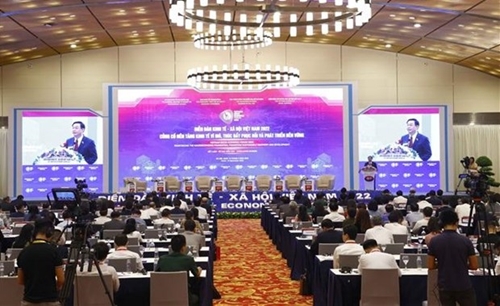This is also the message that the first socio-economic forum wants to spread, he said.
Attention should be paid to credit structure and quality, Hue noted, adding that it is necessary to continue addressing bad debt, restructuring the banking system, handling banks with poor performances, and seeking measures to increase capital for commercial banks, particularly State-own banks and those with State capital.
    |
 |
|
An overview of the Socio-Economic Forum 2022 |
Markets such as stock, financial market, monetary, real estate market, goods and service markets are the “blood vessels” of the economy. Therefore, it is essential to take measures for them to circulate and develop healthily and sustainably, he emphasized.
Regarding long-term goals, the top legislator highlighted the need to maintain economic restructuring, amending, supplementing and perfecting institutions, particularly the Land Law; and exert efforts to turn Vietnam into a developing country with modern industry and upper middle income by 2030, and a developed and high-income country by 2045, as set in the 13th National Party Congress’s Resolution.
At the forum, participants agreed that the world’s quick digital transformation and green energy transition have created many opportunities, but also posed a lot of challenges and difficulties for Vietnam. However, in the context of many countries facing high inflation and low growth, Vietnam has managed to maintain low inflation and achieve high growth.
At a conservative estimate of the Ministry of Planning and Investment, Vietnam may achieve a growth rate of over 7% and keep inflation below 4% this year. The country can also reach USD 750 billion in import-export turnover, doubling the GDP scale.
They also raised concerns over negative impacts of climate change and extreme weather. In Vietnam, in just eight months of 2022, climate change and extreme weather caused losses of VND 6 trillion (USD 253.3 million), 6.7 times higher than that of the same period last year.
Source: VNA